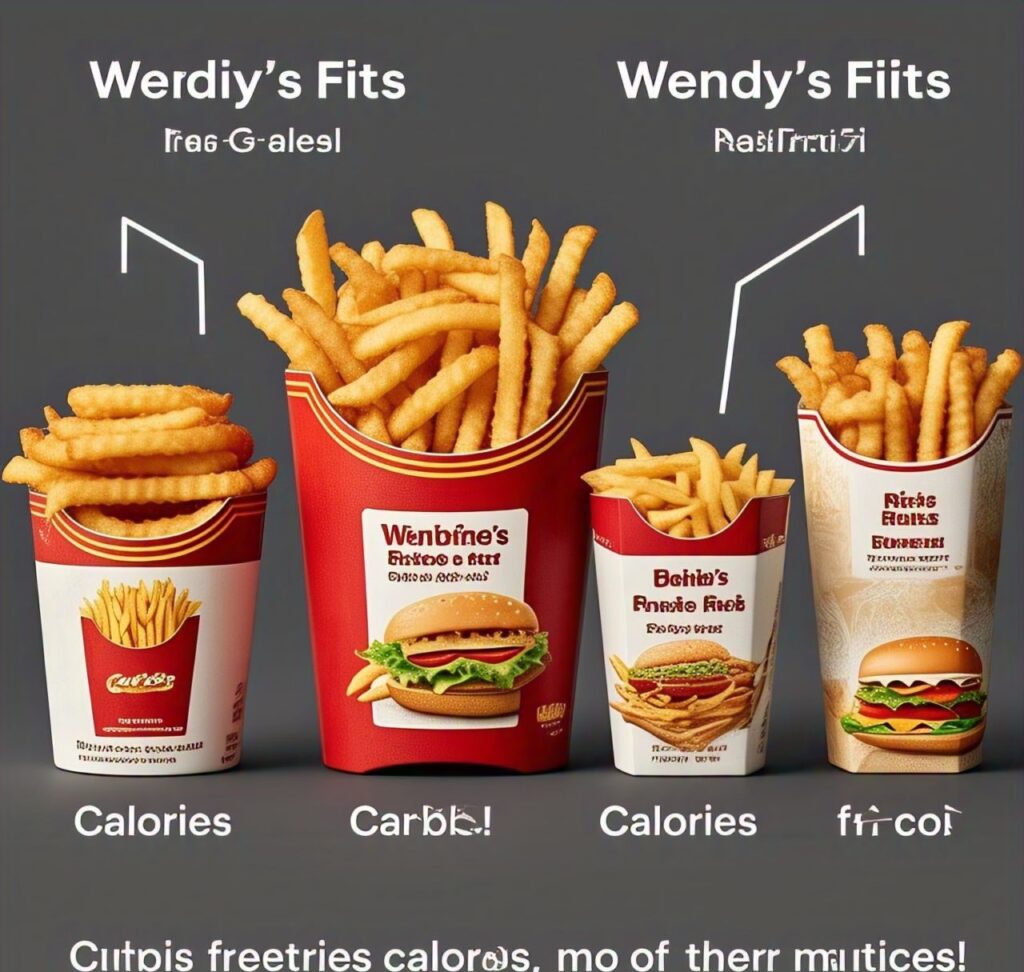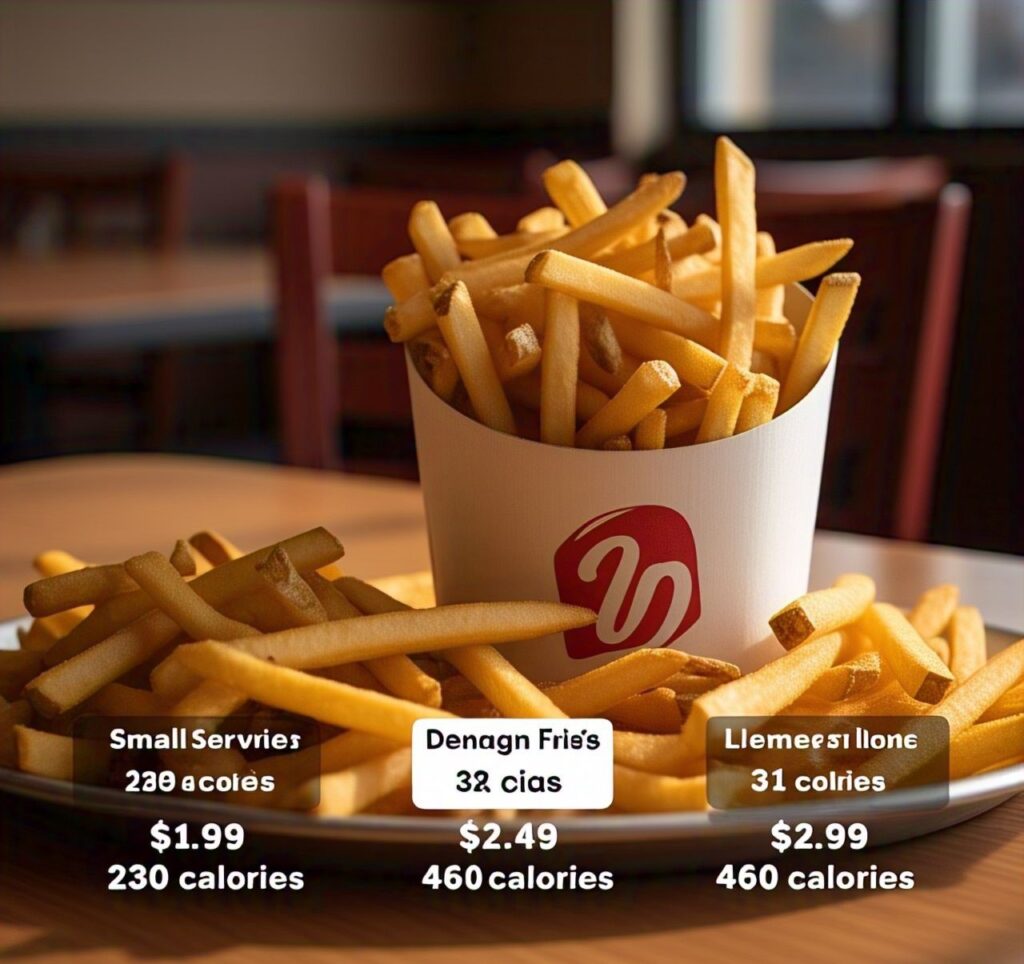Introduction
Wendy’s has established itself as one of the most popular fast-food chains in the world, known for its fresh beef burgers, Frosty desserts, and, of course, its delicious fries. Among its many menu items, Wendy’s fries have gained a loyal fan base due to their crispy texture and satisfying taste. However, as more people become conscious of their nutritional intake, understanding the carb content in Wendy’s fries has become increasingly important.
When analyzing fast food nutrition, carbs play a significant role in determining how these foods fit into various diets. Wendy’s fries carbs contribute to the overall energy provided by the meal but can also impact blood sugar levels, weight management, and dietary restrictions. Whether you are following a low-carb diet or simply watching your carb intake, it is essential to understand how Wendy’s fries fit into your daily nutritional goals.
This article will provide a comprehensive look into Wendy’s fries carbs, including their nutritional breakdown, comparison with other fast-food fries, their effects on different diets, and healthier alternatives. By the end of this guide, you will have all the necessary information to make informed dietary choices while still enjoying your favorite fast-food indulgence.

1. The Popularity of Wendy’s Fries
Wendy’s fries have gained immense popularity due to their unique preparation process and high-quality ingredients. Unlike other fast-food chains that use standard frozen fries, Wendy’s takes pride in using natural-cut, skin-on potatoes, which provide a more authentic taste and texture. The perfect balance of crispiness and softness makes them a top choice for fast-food lovers worldwide. However, the carb content in these fries remains a major consideration for those who track their dietary intake.
The secret behind Wendy’s fries’ success lies in their cooking method. These fries are deep-fried in a blend of vegetable oils, which enhances their flavor and gives them a golden-brown finish. While this cooking process contributes to their rich taste, it also increases the overall calorie and carb content. For individuals monitoring Wendy’s fries carbs, understanding the nutritional impact of this preparation method is crucial.
Consumer demand for Wendy’s fries continues to grow, particularly among those who enjoy pairing them with other popular menu items such as burgers and chicken sandwiches. However, for those watching their carb intake, it is important to consider portion sizes and potential modifications. The love for Wendy’s fries is undeniable, but so is the importance of balancing taste with nutrition. Nutritional Information & Pricing
| Size | Calories | Carbohydrates (g) | Fat (g) | Sodium (mg) | Price (USD) |
|---|---|---|---|---|---|
| Small | 270 | 35 | 13 | 210 | $1.99 |
| Medium | 420 | 50 | 19 | 350 | $2.49 |
| Large | 530 | 63 | 25 | 450 | $2.99 |

2. Nutritional Breakdown of Wendy’s Fries
When examining the nutritional content of Wendy’s fries, carbohydrates make up a significant portion of their composition. A small serving of Wendy’s fries contains approximately 35 grams of carbohydrates, while a medium serving increases to around 50 grams. The large size, often favored by fry enthusiasts, can contain upwards of 63 grams of carbs. These numbers highlight the importance of portion control when consuming Wendy’s fries carbs.
In addition to carbs, Wendy’s fries contain a substantial amount of fat and sodium. The frying process results in approximately 10 to 20 grams of fat per serving, depending on the size. Sodium content is also a concern, with larger servings exceeding 400 milligrams of sodium. While carbs are often the primary focus, it is essential to consider these other nutritional factors when incorporating Wendy’s fries into your diet.
For those aiming to maintain a balanced diet, understanding the distribution of macronutrients in Wendy’s fries is crucial. While the carb content provides energy, excessive consumption may lead to weight gain or blood sugar spikes. Moderation and mindful eating can help individuals enjoy Wendy’s fries carbs without negatively impacting their health goals.
3. Understanding Carbohydrates in Wendy’s Fries
Carbohydrates are one of the primary macronutrients, providing the body with energy for daily activities. In the case of Wendy’s fries, the carbs come from starchy potatoes, which are naturally high in carbohydrates. Once cooked, the starch content becomes more digestible, leading to a rapid increase in blood sugar levels after consumption. This is why individuals monitoring Wendy’s fries carbs should be mindful of their intake.
Not all carbohydrates are created equal, and understanding the difference between simple and complex carbs is essential. Wendy’s fries primarily contain simple carbs due to the frying process, which reduces fiber content and increases the glycemic index. Foods with a high glycemic index, like French fries, can lead to quicker spikes and crashes in blood sugar levels, making them less ideal for those managing diabetes or insulin sensitivity.
Despite their high carb content, Wendy’s fries can still be enjoyed in moderation. Pairing them with a source of protein, such as grilled chicken or a lean beef burger, can slow down the digestion of Wendy’s fries carbs and provide a more balanced meal. For those who love Wendy’s fries but are mindful of their carb intake, finding the right balance is key.

Conclusion
Understanding Wendy’s fries carbs is essential for making informed dietary choices while still enjoying this beloved fast-food item. With a significant carb content, these fries provide a quick energy source but should be consumed in moderation, especially for those on low-carb or specialized diets. Their popularity is undeniable, but being aware of portion sizes and nutritional balance is key.
By considering portion sizes and making mindful pairings, individuals can enjoy Wendy’s fries without compromising their health goals. Whether you are looking for a cheat meal or simply want to indulge, understanding the nutritional impact of Wendy’s fries carbs helps in making smarter food decisions.
Ultimately, while Wendy’s fries remain a favorite among fast-food lovers, moderation is key. Whether you choose to enjoy them occasionally or seek healthier alternatives, being informed about Wendy’s fries carbs ensures that you maintain control over your dietary choices while satisfying your cravings.
FAQs
- How many carbs are in Wendy’s fries?
- Are Wendy’s fries healthier than McDonald’s or Burger King fries?
- Can I eat Wendy’s fries on a low-carb diet?
- Are there any Wendy’s fries alternatives with fewer carbs?
- Do Wendy’s fries contain added sugars or unhealthy ingredients?
- What is the best way to enjoy Wendy’s fries without overloading on carbs?
- Does Wendy’s offer any modifications to make their fries healthier?
- Are Wendy’s fries fried in vegetable oil or something else?
- Can diabetics safely eat Wendy’s fries?
- Are Wendy’s fries gluten-free?

